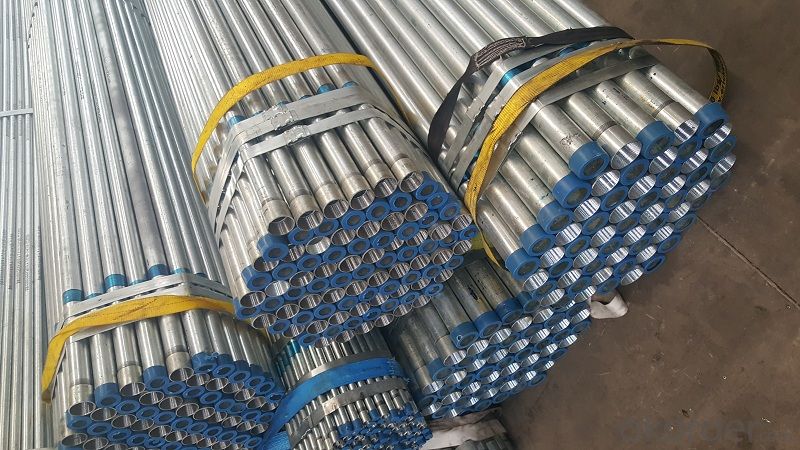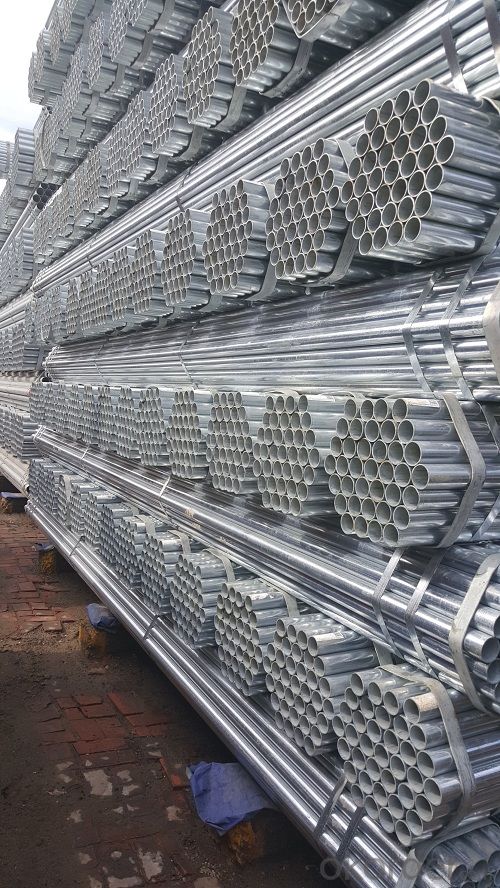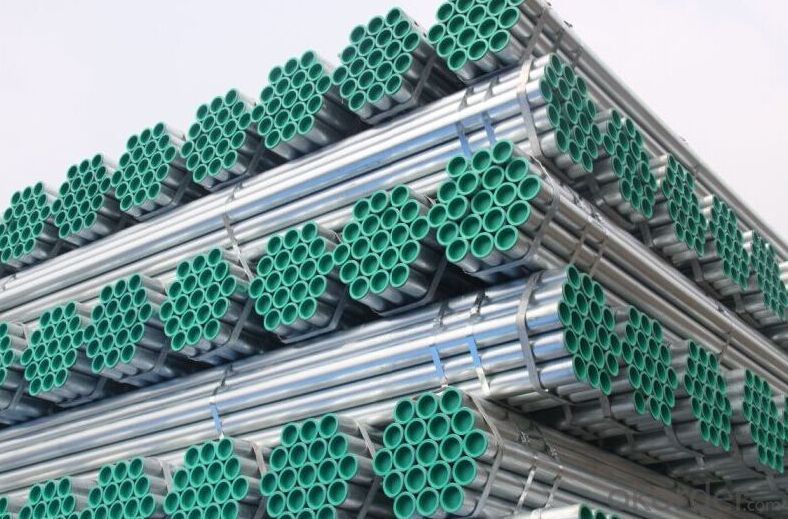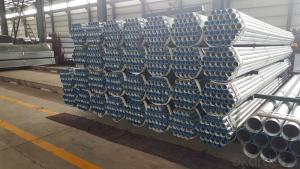Galvanized welded steel tubes for equipment
- Loading Port:
- Tianjin
- Payment Terms:
- TT OR LC
- Min Order Qty:
- 10 m.t.
- Supply Capability:
- 20000 m.t./month
OKorder Service Pledge
OKorder Financial Service
You Might Also Like
Item specifice
1、Structure of Galvanized welded steel pipe for materials :
The surface of galvanized steel pipe welded steel pipe of hot dip galvanized layer or. Galvanized can increase the corrosion resistance of the steel tube, prolong service life. Galvanized pipe is widely used, in addition to water, gas, oil and other general low pressure fluid pipelines. It is also used in the petroleum industry, especially for offshore oil field of oil well pipe and oil pipe, chemical, coking equipment of oil heater, condensation cooler, coal run oil exchanger tube, and trestle pile, the mine tunnel support frame tube.
2、Main Features of Galvanized welded steel pipe for building materials :
• High manufacturing accuracy
• High strength
• Good visual effect
• Reasonable price
3、 Galvanized welded steel pipe for building materials Specification:
Standard | GB, DIN, ASTM ASTM A106-2006, ASTM A53-2007 |
Grade | 10#-45#, 16Mn 10#, 20#, 45#, 16Mn |
Thickness | 1 - 33 mm |
Section Shape | Round |
Outer Diameter | 21 - 610mm |
Place of Origin | Tianjin, China (Mainland) |
Secondary Or Not | Non-secondary |
Application | Hydraulic Pipe |
Technique | Cold Drawn |
Certification | API |
Surface Treatment | factory state or painted black |
Special Pipe | API Pipe |
Alloy Or Not | Non-alloy |
Length | 5-12M |
Outer Diameter | 21.3-610mm |
Grade | 20#, 45#, Q345, API J55, API K55, API L80, API N80, API P110, A53B |
Standard | ASME, ASTM |
1) Material:Q195 Q235 Q345 X42 X52
2) Specification range:OD:21.3-610mm,WT:6-70mm,length:6-12m or according to the requirement of clients.
3) Excutive standards:GB,ASME API5L.ASTM A 106/A53,Despite of the above standards,we can also supply seamless steel pipe with standard of DIN,JIS,and so on,and also develop new products according to the requirements
4、Packaging & Delivery
Packaging Details: | seaworthy package,bundles wrapped with strong steel strip |
Delivery Detail: | 15-30days after received 30%TT |
5、FAQ of Galvanized welded steel pipe for building materials :
①How is the quality of your products?
Our products are manufactured strictly according to national and internaional standard, and we take a test
on every pipe before delivered out. If you want see our quality certifications and all kinds of testing report, please just ask us for it.
Guaranteed: If products’ quality don’t accord to discription as we give or the promise before you place order, we promise 100% refund.
②How about price?
Yes, we are factory and be able to give you lowest price below market one, and we have a policy that “ for saving time and absolutely honest business attitude, we quote as lowest as possible for any customer, and discount can be given according to quantity”,if you like bargain and factory price is not low enough as you think, just don’t waste your time.Please trust the quotation we would give you, it is professional one.
6、 Galvanized welded steel pipe for building materials Images:



- Q:How are steel pipes used in the manufacturing of chemical processing plants?
- Steel pipes are commonly used in chemical processing plants for various purposes, such as transporting fluids and gases, as well as providing structural support. They are highly resistant to corrosion, making them ideal for handling corrosive materials in the plant. Additionally, steel pipes can withstand high temperatures and pressure, ensuring the safe and efficient operation of chemical processes.
- Q:What are the safety precautions to consider when working with steel pipes?
- When working with steel pipes, it is important to consider several safety precautions. First, always wear personal protective equipment, including gloves, safety glasses, and steel-toed boots to protect against potential injuries. Additionally, ensure that the work area is clear of any tripping hazards and that all tools and equipment are in good working condition. It is crucial to follow proper lifting techniques and use machinery or equipment, such as cranes or forklifts, to move heavy steel pipes to prevent strains or injuries. Furthermore, be cautious of potential fire hazards by keeping flammable materials away from the work area and having fire extinguishers readily available. Finally, regularly inspect the steel pipes for any defects or damages, as working with compromised pipes can pose significant risks.
- Q:Are steel pipes suitable for use in hydropower plants?
- Yes, steel pipes are suitable for use in hydropower plants. Steel pipes offer excellent durability, strength, and resistance to corrosion, making them ideal for transporting water or other fluids in hydropower systems. Additionally, steel pipes can withstand high pressure and provide efficient flow rates, ensuring reliable and efficient operation of the hydropower plant.
- Q:How are steel pipes used in the manufacturing of pressure vessels?
- Steel pipes are commonly used in the manufacturing of pressure vessels as they provide the necessary strength and durability to withstand high internal pressure. These pipes are welded or seamless and are often used as the main structural component of the vessel. They allow for the efficient flow of fluids or gases within the vessel and provide a reliable and secure containment system for various industrial applications.
- Q:How are steel pipes insulated?
- Steel pipes can be insulated using various methods such as applying insulation materials like foam or fiberglass wraps, using thermal tapes, or employing pre-insulated pipe systems where insulation is integrated into the pipe during manufacturing.
- Q:Are steel pipes suitable for industrial cooling systems?
- Yes, steel pipes are generally suitable for industrial cooling systems. Steel is a strong and durable material that can withstand high pressure and temperature fluctuations commonly found in cooling systems. It has excellent resistance to corrosion, making it ideal for use with water or other coolants. Additionally, steel pipes have good thermal conductivity, allowing for efficient heat transfer in the cooling process. They are also readily available and cost-effective, making them a popular choice in industrial applications.
- Q:Hot galvanized steel pipe for use?
- The use of hot galvanized steel pipe: mainly used for the delivery of gas, heating.In the greenhouse gas, heating, with the kind of pipe and galvanized pipe, galvanized pipe as a water pipe, produced a lot of rust in the tube, the outflow of water not only pollute the sanitary ware, and mixed with smooth inner wall corrosion caused by bacteria, heavy metal content in the water is too high, serious harm to human health. In 60s and 70s, developed countries began to develop new types of pipes, and galvanized pipes were banned. China's Ministry of construction and other four ministries have also issued a civilization, from two, 000 years since the prohibition of galvanized pipe, the current New District cold water pipe has rarely used galvanized pipe, and some of the hot water pipe is galvanized pipe.
- Q:Can steel pipes be used for conveying corrosive substances?
- Steel pipes can be used for conveying corrosive substances, but it is important to choose the right type of steel and consider additional protective measures. Stainless steel pipes, for example, are highly resistant to corrosion and can handle a wide range of corrosive substances. However, it is crucial to consider the specific corrosive properties of the substance being conveyed and the concentration levels. In some cases, additional protective coatings or linings may be necessary to prevent corrosion and ensure the longevity of the steel pipes. Regular maintenance and inspection are also essential to detect and address any signs of corrosion to prevent leaks or failures in the piping system. Overall, steel pipes can be used for conveying corrosive substances, but proper material selection, protective measures, and maintenance are vital to ensure safe and efficient operations.
- Q:How to make the steel pipe spray paint is not easy to fall off?
- First, clean the surface of the object to be sprayed (pay attention to whether or not to paint off, which is the key):Remove rust stains, oil and so on, when spraying, the nozzle and spray the best distance is 20cm, should be two times forming, first thin spray again, dry, and then spray second times, this is more uniform, and not easy to hang
- Q:How are steel pipes used in the construction of airports?
- Steel pipes are used in the construction of airports for various purposes such as drainage systems, fuel pipelines, water supply networks, and structural support for buildings and runways.
1. Manufacturer Overview |
|
|---|---|
| Location | |
| Year Established | |
| Annual Output Value | |
| Main Markets | |
| Company Certifications | |
2. Manufacturer Certificates |
|
|---|---|
| a) Certification Name | |
| Range | |
| Reference | |
| Validity Period | |
3. Manufacturer Capability |
|
|---|---|
| a)Trade Capacity | |
| Nearest Port | |
| Export Percentage | |
| No.of Employees in Trade Department | |
| Language Spoken: | |
| b)Factory Information | |
| Factory Size: | |
| No. of Production Lines | |
| Contract Manufacturing | |
| Product Price Range | |
Send your message to us
Galvanized welded steel tubes for equipment
- Loading Port:
- Tianjin
- Payment Terms:
- TT OR LC
- Min Order Qty:
- 10 m.t.
- Supply Capability:
- 20000 m.t./month
OKorder Service Pledge
OKorder Financial Service
Similar products
New products
Hot products
Related keywords































